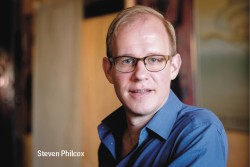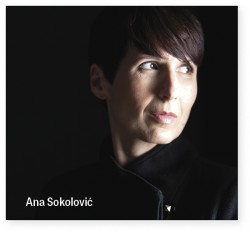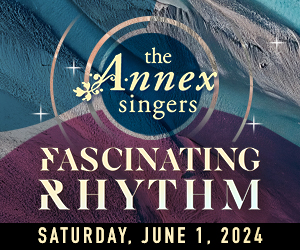 The Canadian Art Song Project is going big for the 150th birthday of the federation and Toronto’s biggest contemporary music festival 21C will host the party: 12 poets in a song cycle world premiere with four singers and a piano, alongside two song cycles for baritone and piano both performed for the first time in Ontario. And when I say party, I am not exaggerating. All three composers will be in attendance on May 25 at the Temerty Theatre at the RCM, as will most of the poets (Lucy Maud Montgomery and E.J Pratt have good excuses), and will stay after the concert together with the singers and pianists for an open panel conversation with the audience and to answer questions.
The Canadian Art Song Project is going big for the 150th birthday of the federation and Toronto’s biggest contemporary music festival 21C will host the party: 12 poets in a song cycle world premiere with four singers and a piano, alongside two song cycles for baritone and piano both performed for the first time in Ontario. And when I say party, I am not exaggerating. All three composers will be in attendance on May 25 at the Temerty Theatre at the RCM, as will most of the poets (Lucy Maud Montgomery and E.J Pratt have good excuses), and will stay after the concert together with the singers and pianists for an open panel conversation with the audience and to answer questions.
Marilyn Dumont’s lower-case titled poem dawn always begins in the bones is where composer Ana Sokolović got the title for the largest work on the program, a cycle commissioned by the CASP’s two artistic directors, Steven Philcox and Lawrence Wiliford. “We wanted something quite substantial to celebrate the sesquicentennial,” explained Philcox when we caught up with him in late April. “Both of us wanted to find a piece that would be a bit larger in scope, and that would possibly be breaking some of the established traditions of the song cycle.” They asked Sokolović, a composer known for her flair for incorporating the dramatic and the visual into her music as well as for the keenness to experiment, to create a cycle for four voices (SMTB) rather than one. She used texts by a wide range of poets; they hail from all the provinces, ethnic backgrounds, ages and poetic philosophies. There are poets from the past (E.J. Pratt and L.M. Montgomery) but most of the poems are by our contemporaries: Marilyn Dumont, George Elliott Clarke, Lorna Crozier, Christian Bök, Herménégilde Chiasson, Rienzi Crusz, Roo Borson, haiku writer Nick Avis, Ariel Gordon and the late Quebec Automatist Claude Gauvreau. Musically too, says Philcox, “Sokolović managed to capture the vivid and varied landscape of Canada.”
Sometimes a song may start as a solo and proceed as a duo or start as a duo that progresses into a trio. Everything will be in flux over the 40 minutes of the duration of the piece. There are times in the cycle when singers are tasked with playing ukulele and percussion instruments, and playing on the exposed piano strings with mallets. The young director and frequent collaborator with MYOpera, Anna Theodosakis, was hired as the “directorial eye” in putting this piece with a strong visual component together.
By the time of the two workshop performances they already knew, Philcox says, that the work would have the alchemy of that rare perfect combination between the creators and performers. It was clear to them from the beginning that “It’s Canada’s youngest talent who should be presenting it – those who will carry us into the bicentennial.” Four of the Canadian Opera Company Ensemble Studio members sing the songs, soprano Danika Lorèn, mezzo Emily D’Angelo, tenor Aaron Sheppard and baritone Bruno Roy, and will be accompanied on the piano by the head of the Ensemble Studio, Liz Upchurch. Their enthusiasm for the project and their youthful energy further fuelled the cycle. Sokolović has gotten to know the singers over time and has occasionally made adjustments to play to their specific strengths. Lorèn and D’Angelo went to meet with her in Montreal and after hearing them sing the composer was so inspired by their companionship in timbre and their joint beauty of sound that she wrote a song for them literally overnight: she rushed to find the suitable poem immediately after the meeting and worked on it, sleep be damned, until it was done.
For those of us impatient to hear it, Dawn Always Begins in the Bones will have its ante-premiere in the COC’s noon-hour vocal series at the Richard Bradshaw Amphitheatre of the Four Seasons Centre on May 17. On May 25 at the RCM, however, it will be presented in a full-sized concert (plus the post-performance discussion) with two other vocal works, by Andrew Staniland and by Lloyd Burritt.
Staniland’s Peter Quince at the Clavier for baritone and piano was originally composed for American Opera Projects: Composers and the Voice in 2008 and had its world premiere in Santa Fe with an American cast of musicians. The poem by Wallace Stevens is very distantly based on the character Peter Quince, the director of the tradesmen-players ensemble in Shakespeare’s A Midsummer Night’s Dream. The text actually dwells more on the story from the biblical Apocrypha about Susanna and the voyeur elders – and the unnamed woman who brought the story to the narrator’s mind. Thinking of your blue-shadowed silk / Is music. It is like the strain / Waked in the elders by Susanna and on and on; perhaps it is a Peter Quince-like figure attempting art song composition with no music other than Wallace Stevens’ poetic sense. On the music inherent in the poem itself a lot has been written (there’s a compilation of key excerpts from a number of studies on the University of Illinois’ English Department poetry pages) so adding actual music to it must have been an intriguing kind of a challenge. You can find out how Staniland solved this puzzle by heading to YouTube, where the composer generously uploaded the entire piece with the visuals closely following the score. “Writing is often sparse and rhythmically fraught and quite ferocious,” Philcox says about the music. “The baritone gets to do a lot of interesting things, including sing in the falsetto range.” Iain MacNeil will be accompanied by Mélisande Sinsoulier from the piano.
Sinsoulier and MacNeil will also perform the final song cycle in the program, the BC-based composer Lloyd Burritt’s Moth Poem set to the serial poem of that name by Robin Blaser (1925-2009). “It’s a piece that harkens back to the more traditional musical landscape and complements the rest of the program,” says Philcox. “It’s very evocative, lush at times, very melodic and tonal.”
Quick Picks
Natalie Dessay returns to Toronto for a recital at Koerner Hall May 2 with the always brilliant Philippe Cassard at the piano. (Search for his name in the French public radio stations France Musique and France Culture websites; he unfailingly gives enlightening and entertaining interviews.) The program, conceived under the very broad umbrella of “Women’s Portraits,” includes Mozart, Gounod, Schubert, Pfitzner, Debussy, Bizet and Chausson, plus possible encores. Dessay is not best known for her Lieder singing, but after her soft retirement from the stage she is now moving into the art song territory – her latest CD is an all-Schubert recording with Cassard at the piano.
The COC’s lunch-hour Vocal Series is particularly rich this month. On May 9, mezzo Allyson McHardy will sing Schumann’s Poèmes de la reine Marie d’Écosse, Zemlinsky’s Six Songs after Poems by Maeterlinck. Rachel Andrist is at the piano. May 10, COC’s Ensemble Studio tenor Aaron Sheppard sings Finzi’s A Young Man’s Exhortation based on the poetry of Thomas Hardy and May 11 one of Ensemble Studio’s mezzos Lauren Eberwein and the members of the COC orchestra present a program of two Bach cantantas, Ich habe genug, BWV82, and Vergnügte Ruh, BWV 170. Tenor Charles Sy and pianist Hyejin Kwon will perform Schubert’s Die schöne Müllerin in their final Ensemble Studio graduation concert on May 18. All concerts are free and start at noon in the Richard Bradshaw Amphitheatre, Four Seasons Centre for the Performing Arts.
The very last two concerts to be played by Talisker Players as a presenting ensemble are their May 16 and 17 performances of “A Mixture of Madness.” Soprano Ilana Zarankin will sing Purcell’s Mad Songs for soprano, strings and continuo, Ralph Vaughan Williams’ Songs of William Blake for soprano and oboe and Marina Tsvetaeva’s Insomnia set to music by John Plant (with saxophone and piano). Baritone Bruce Kelly will sing a song from Mitch Leigh’s musical Man of La Mancha, “The Impossible Dream,” in the chamber ensemble arrangement by Laura Jones. He will also interpret Peter Maxwell Davies’ Eight Songs for a Mad King. The Talisker Players-commissioned Alice Ping Ye Ho’s The Madness of Queen Charlotte (text by Phoebe Tsang) for flute, viola, cello and piano will have its world premiere on the same night. Actor Andrew Moodie will read from select letters, diaries and memoirs. Concerts start at 8pm but there will be pre-concert chats starting at 7:15pm on both nights; at Trinity-St. Paul’s Centre.
Lydia Perović is an arts journalist in Toronto. Send her your art-of-song news to artofsong@thewholenote.com.




